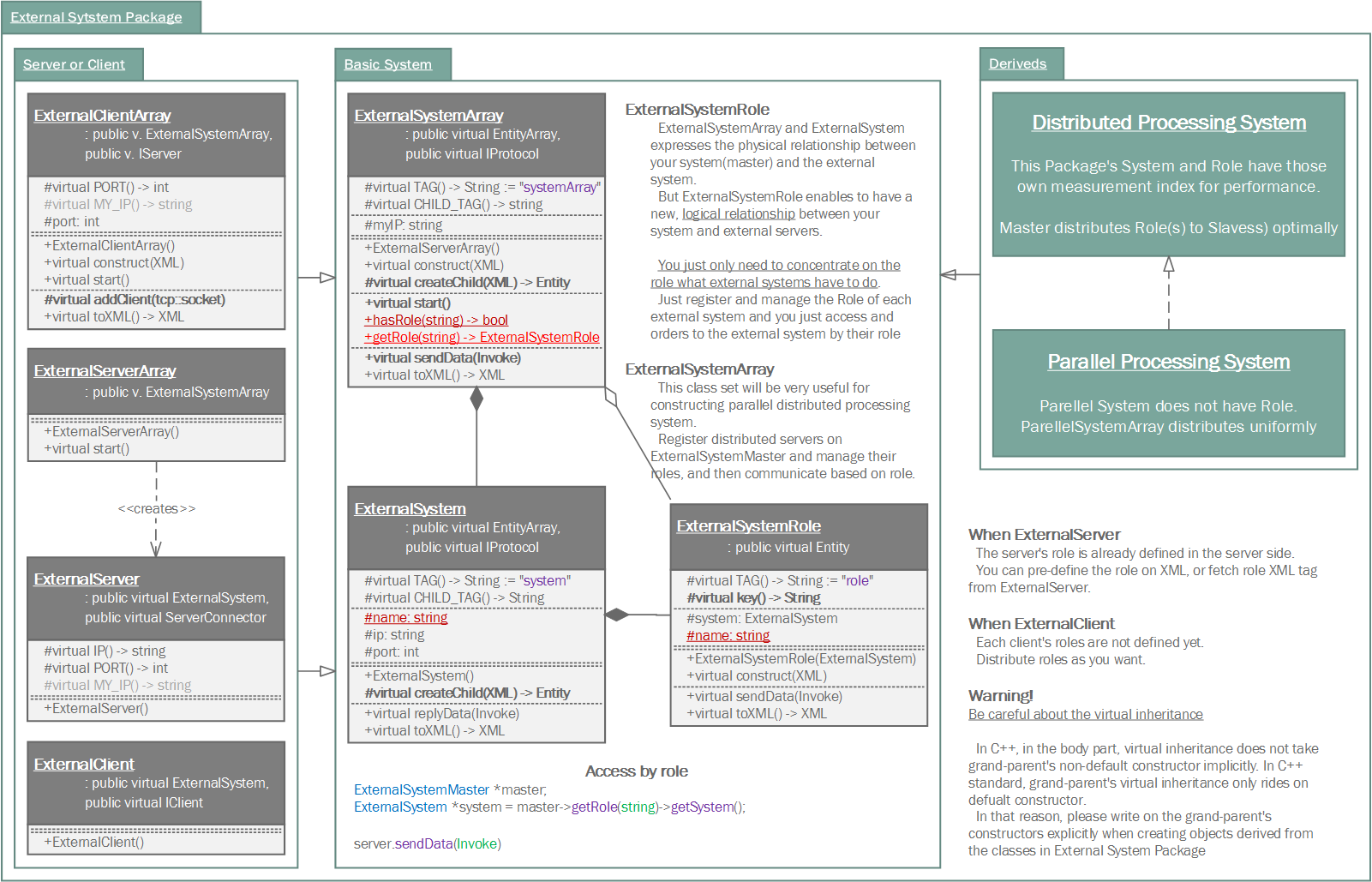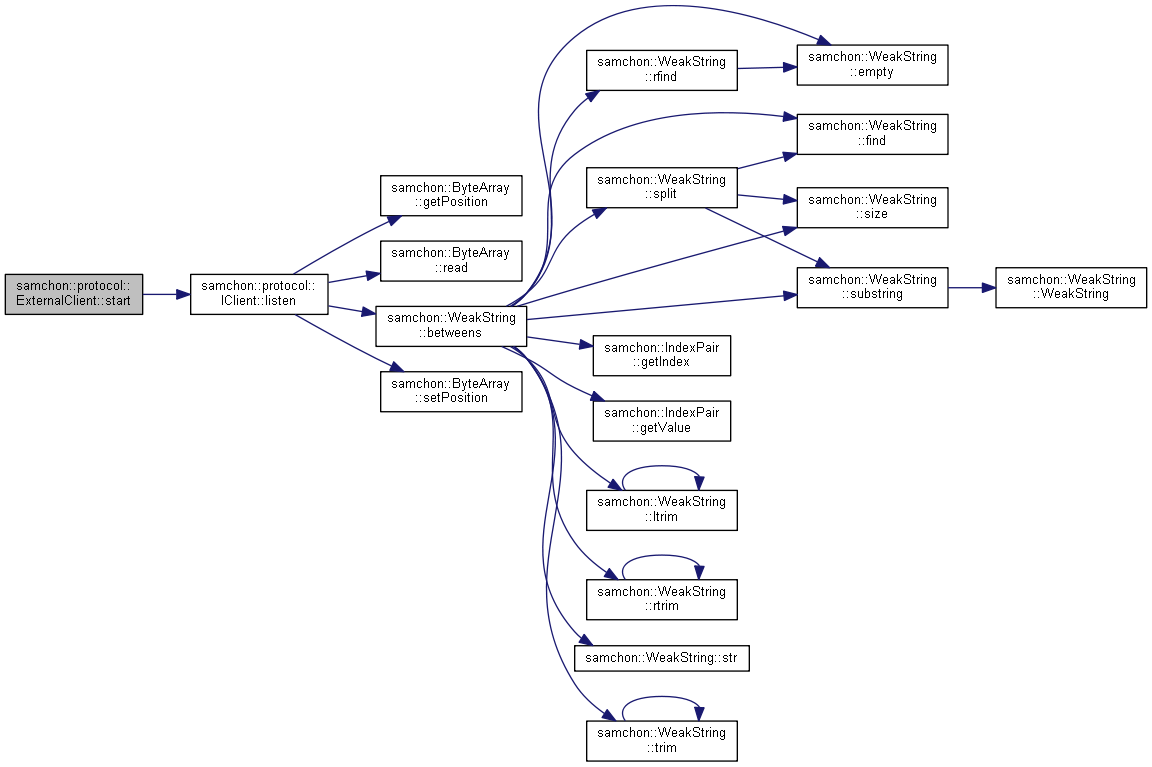|
Samchon Framework for CPP
1.0.0
|
|
Samchon Framework for CPP
1.0.0
|
A network driver for an external client. More...
#include <ExternalClient.hpp>

Public Member Functions | |
| ExternalClient () | |
| Default Constructor. More... | |
| virtual void | start () override |
| Start interaction. More... | |
 Public Member Functions inherited from samchon::protocol::ExternalSystem Public Member Functions inherited from samchon::protocol::ExternalSystem | |
| ExternalSystem () | |
| Default Constructor. More... | |
| virtual void | construct (std::shared_ptr< library::XML >) override |
| Construct data of the Entity from an XML object. More... | |
| virtual auto | key () const -> std::string override |
| Get a key that can identify the Entity uniquely. More... | |
| virtual void | replyData (std::shared_ptr< Invoke >) override |
| Handling replied message from an external system. More... | |
| virtual auto | TAG () const -> std::string override |
| A tag name when represented by XML. More... | |
| virtual auto | CHILD_TAG () const -> std::string override |
| A tag name of children. More... | |
| virtual auto | toXML () const -> std::shared_ptr< library::XML > override |
| Get an XML object represents the EntityGroup. More... | |
 Public Member Functions inherited from samchon::protocol::EntityGroup< _Container, _ETy, T > Public Member Functions inherited from samchon::protocol::EntityGroup< _Container, _ETy, T > | |
| EntityGroup () | |
| Default Constructor. More... | |
| auto | has (const std::string &key) const -> bool |
| Indicates whether a container has an object having the specified identifier. More... | |
| auto | get (const std::string &key) -> value_type & |
| Access the element by specified identifier(key). More... | |
| auto | get (const std::string &key) const -> const value_type & |
| Access the const element by specified identifier(key). More... | |
 Public Member Functions inherited from samchon::protocol::Entity Public Member Functions inherited from samchon::protocol::Entity | |
| Entity () | |
| Default Constructor. More... | |
 Public Member Functions inherited from samchon::protocol::IEntityGroup Public Member Functions inherited from samchon::protocol::IEntityGroup | |
| IEntityGroup () | |
| Default Constructor. More... | |
 Public Member Functions inherited from samchon::protocol::IClient Public Member Functions inherited from samchon::protocol::IClient | |
| IClient () | |
| Default Constructor. More... | |
| virtual void | listen () |
| Listens message from a related system. More... | |
| virtual void | sendData (std::shared_ptr< Invoke >) |
| Sends message to a related system. More... | |
 Public Member Functions inherited from samchon::protocol::IProtocol Public Member Functions inherited from samchon::protocol::IProtocol | |
| IProtocol () | |
| Default Constructor. More... | |
Additional Inherited Members | |
 Protected Member Functions inherited from samchon::protocol::EntityGroup< _Container, _ETy, T > Protected Member Functions inherited from samchon::protocol::EntityGroup< _Container, _ETy, T > | |
| virtual auto | createChild (std::shared_ptr< library::XML >) -> entity_type *=0 |
| Factory method of a child Entity. More... | |
 Protected Member Functions inherited from samchon::protocol::IClient Protected Member Functions inherited from samchon::protocol::IClient | |
| virtual auto | BUFFER_SIZE () const -> size_t |
| Buffer size of network I/O. More... | |
| virtual void | _replyData (std::shared_ptr< Invoke >) |
| A method for pre-processing replied Invoke message. More... | |
 Protected Attributes inherited from samchon::protocol::ExternalSystem Protected Attributes inherited from samchon::protocol::ExternalSystem | |
| std::string | name |
| A name can identify an external system. More... | |
| std::string | ip |
| An ip address of an external system. More... | |
| int | port |
| A port number of an external system. More... | |
 Protected Attributes inherited from samchon::protocol::IClient Protected Attributes inherited from samchon::protocol::IClient | |
| Socket * | socket |
| Socket for network I/O. More... | |
| std::mutex * | sendMtx |
| A mutex for sending message. More... | |
A network driver for an external client.
ExternalClient is an ExternalSystem specialized in client driver.
ExternalSystem is a boundary class interacting with an external system by network communication. Also, ExternalSystem is an abstract class that a network role, which one is server and which one is client, is not determined yet.
The ExternalSystem has ExternalSystemRole(s) groupped methods, handling Invoke message interacting with the external system, by subject or unit of a moudle. The ExternalSystemRole is categorized in a 'control'.

The ExternalSystem class takes a role of interaction with external system in network level. However, within a framework of Samchon Framework, a boundary class like the ExternalSystem is not such important. You can find some evidence in a relationship between ExternalSystemArray, ExternalSystem and ExternalSystemRole.
Of course, the ExternalSystemRole is belonged to an ExternalSystem. However, if you access an ExternalSystemRole from an ExternalSystemArray directly, not passing by a belonged ExternalSystem, and send an Invoke message even you're not knowing which ExternalSystem is related in, it's called "Proxy pattern".
Like the explanation of "Proxy pattern", you can utilize an ExternalSystemRole as a proxy of an ExternalSystem. With the pattern, you can only concentrate on ExternalSystemRole itself, what to do with Invoke message, irrespective of the ExternalSystemRole is belonged to which ExternalSystem.
Definition at line 20 of file ExternalClient.hpp.
| ExternalClient::ExternalClient | ( | ) |
Default Constructor.
Definition at line 13 of file ExternalClient.cpp.
|
overridevirtual |
Start interaction.
An abstract method starting interaction with an external system.
If an external systems are a server, starts connection and listening Inovoke message, else clients, just starts listening only. You also can addict your own procudures of starting the driver, but if you directly override method of abstract ExternalSystem, be careful about virtual inheritance.
Implements samchon::protocol::ExternalSystem.
Definition at line 17 of file ExternalClient.cpp.
References samchon::protocol::IClient::listen().
Referenced by samchon::protocol::ExternalClientArray::addClient().

